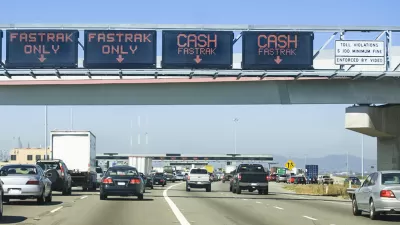A California taxpayers association has challenged the June passage of a regional ballot measure because it didn't receive two-thirds support from voters, although two prior voter-approved bridge toll increases also fell short of a super-majority.

On June 5, over 55 percent of voters in nine Bay Area counties approved Regional Measure 3 (RM 3), sponsored by the Metropolitan Transportation Commission (MTC), to hike tolls on seven state-owned bridges by $3 over six years, funding over $4.5 billion in transportation capital projects and transit operating costs over 25 years. [See expenditure plan (pdf)].
"The Howard Jarvis Taxpayers Association filed the suit Thursday [July 5] in San Francisco Superior Court against the Bay Area Toll Authority [overseen by MTC]" reports Erin Baldassari for The Mercury News on July 9.
It challenges the notion that Regional Measure 3, which voters approved last month [also posted here with state ballot measure results], is a “fee” requiring only a simple majority to pass, rather than a “tax,” which requires two-thirds voter approval. The suit asks that the toll be invalidated.
In some ways, the lawsuit [pdf] bears similarity to Proposition 6, the gas tax repeal initiative that California voters will decide on November 6, in the sense that it challenges the approval of a multi-billion funding program, whether by voters (RM 3) or their legislative representatives (Senate Bill 1, the Road Repair and Accountability Act of 2017), based on increasing user fees that are subsequently challenged by tax opponents.
The Jarvis association objects to the majority of toll revenues not benefiting toll-payers directly, which they claim makes it more of a tax than a fee. According to an earlier email to Planetizen from MTC, "the final mode split (including operating funds) is 69% transit, 25% highway (interchange improvements, express lanes and some safety projects), 3% multimodal (goods movement/mitigation) and 3% bike/ped." [Also see FAQ on the measure (pdf)]
Defending the expenditure plan, Jim Wunderman, the president and CEO of the Bay Area Council, an organization that represents businesses in the region and one that helped campaign for the measure, stated:
"Regional Measure 3 will effectively add greater capacity to our bridges by … improving and expanding critical regional mass transit systems and providing other good alternatives like bicycling and walking.”
Timothy Bittle, Director of Legal Affairs for the Howard Jarvis Taxpayers Association, also cited Proposition 26, "Supermajority Vote to Pass New Taxes and Fees (2010)," as another argument supporting the suit, adds Baldassari.
Fees that benefit the public broadly — rather than providing services directly to the fee payer, such as garbage fees or state park entrance fees — would be considered a tax under Prop 26, the state Legislative Analyst's Office said.
Regional Measures 1 and 2, which also increased tolls on the same, seven state-owned bridges, were approved by voters in 1988 and 2004, respectively. In addition to preceding Prop 26, more of the toll revenue went to the bridges and highways in capital improvements. However, Wunderman expressed confidence that "the suit will be dismissed or defeated in court."
Related posts from Planetizen archives:
-
November 23, 2010In California, passage of Proposition 26 has raised the question of whether fees used for public services will be jeopardized at the local level. Some argue most fees will be unaffected, but others could take a hit.The Sacramento Bee
-
November 8, 2010While Propositions 19 (marijuana) and 23 (global warming suspension) grabbed headlines, Prop 26, which would require a 2/3rds vote threshold for fees, slipped under the radar and passed. Opponents say it could make regulation nearly impossible.The New York Times - Energy & Environment
Hat tip to MTC News Headlines.
FULL STORY: Lawsuit targets toll authority over $3 bridge toll increase

Planetizen Federal Action Tracker
A weekly monitor of how Trump’s orders and actions are impacting planners and planning in America.

Maui's Vacation Rental Debate Turns Ugly
Verbal attacks, misinformation campaigns and fistfights plague a high-stakes debate to convert thousands of vacation rentals into long-term housing.

Restaurant Patios Were a Pandemic Win — Why Were They so Hard to Keep?
Social distancing requirements and changes in travel patterns prompted cities to pilot new uses for street and sidewalk space. Then it got complicated.

In California Battle of Housing vs. Environment, Housing Just Won
A new state law significantly limits the power of CEQA, an environmental review law that served as a powerful tool for blocking new development.

Boulder Eliminates Parking Minimums Citywide
Officials estimate the cost of building a single underground parking space at up to $100,000.

Orange County, Florida Adopts Largest US “Sprawl Repair” Code
The ‘Orange Code’ seeks to rectify decades of sprawl-inducing, car-oriented development.
Urban Design for Planners 1: Software Tools
This six-course series explores essential urban design concepts using open source software and equips planners with the tools they need to participate fully in the urban design process.
Planning for Universal Design
Learn the tools for implementing Universal Design in planning regulations.
Heyer Gruel & Associates PA
JM Goldson LLC
Custer County Colorado
City of Camden Redevelopment Agency
City of Astoria
Transportation Research & Education Center (TREC) at Portland State University
Jefferson Parish Government
Camden Redevelopment Agency
City of Claremont





























